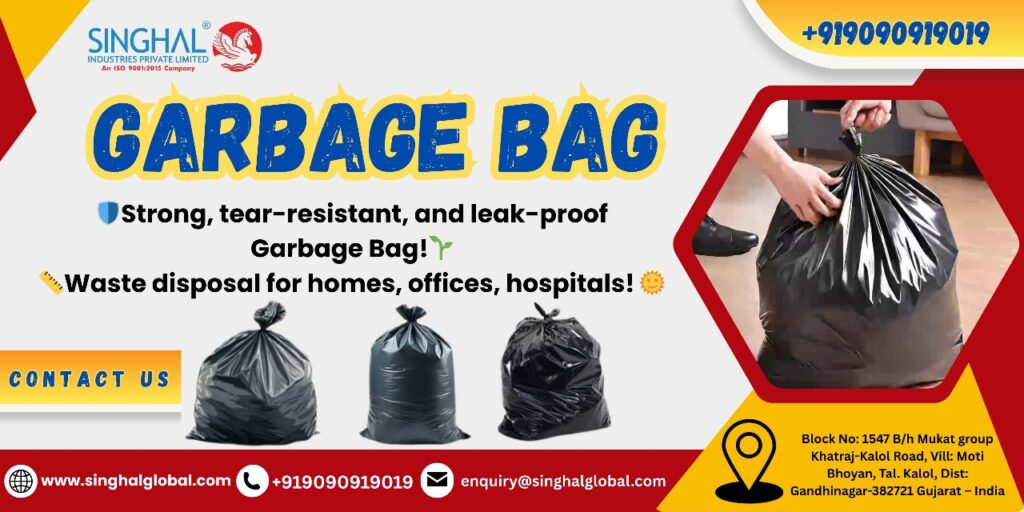If you take out an empty plastic bag to dispose of garbage, it may seem as if it’s a routine thing you do in your day-to-day routine. But beneath that garbage bag lies a rapidly changing story of sustainability, innovation, as well as technology. Garbage bags, which were once thought of as disposable plastic, today are entering into a brand new time, thanks to Garbage bag manufacturers in India and garbage bag makers in the USA that are working to develop greener, more efficient solutions. The world is now waking up to the fact that the issue of managing waste is much more than “out of sight, out of mind.” From biodegradable bags to IoT-enabled garbage tracking, the future of garbage bags is fascinating. Yes, it directly influences how we live healthier, safer, more accountable lives.
A Shift from Convenience to Consciousness
In the past, there was no thought about a trash bag. The only thing that people were concerned about was whether the bag could hold the waste and not tear. The least expensive garbage bag made of plastic was always the most popular option. However, the times have changed. With the increasing awareness of the dangers of plastics, cities all over the world are searching for alternatives that are robust and safe for the environment. For example, in India, restrictions on single-use plastics caused garbage bag manufacturers in India to rethink their manufacturing strategies. While in the USA, the stricter recycling laws have pushed Garbage bag manufacturers in USA to explore recycling plastics as well as plant-based resins. It’s no longer about convenience; it’s more about conscience.
Smart Materials Leading the Way
Imagine a trash can that informs you when it’s full. It could also decompose naturally in soil in some months. These aren’t far-fetched ideas; they’re moving.
- Biodegradable Bags: Made of potatoes, cornstarch, or other plant-based substances. They dissolve in nature and do not leave microplastics behind.
- Compostable Bags: Perfect for food waste. They break down in composting ecosystems, adding value and not causing pollution.
- Antimicrobial Bags: They have coatings that inhibit the growth of bacteria, especially in food and healthcare facilities or hospitals.
- Sensor-integrated bags: The most interesting designs have been tried in Europe and the USA. The sensors can detect how much waste is in the bins and assist cities to better collect garbage by using these bags.
The very first thing I saw in a demo which involved a biodegradable trash bin at a sustainability fair amazed me. It was identical in appearance to any other liner created of plastic, however, when placed in the compost, it turned into nutrient-filled organic material within a few weeks. This moment made me realize that something so boring as a garbage can could actually be a revolutionary item.
Sustainable Designs for Everyday Life
Beyond the material, design innovation is also crucial. Modern garbage bags are no longer simply thin plastic sheets. They are designed in a sustainable manner and in consideration with users’ experience.
- Drawstring Bags: Seals easily and this minimizes the chances of leaks and messes.
- Segmented Bags: permission to sort waste at the source of origin (wet, dry and recyclable).
- Thicker Heavy-Duty Bags: These are used where the clean-up is on a large scale. They also do away with the need to double bags.
- Recycled Plastic Bags: Many Plastic bag for garbage producers in the USA are now producing lines made from 70-100% reused plastic.
At first, I thought it was insignificant—three separate containers for garbage? Over time, it became easier to recycle and reduced the stress of mixing food waste and plastic wrappers. This small change in design made a huge difference in how my family handles waste.
The Global Market Dynamics
In a way, the garbage bag industry is a reflection of regional priorities. Even in India a lower price remains a factor. The customers want the solutions to be long-lasting and affordable, that is why the producers have to compromise between recycled plastics and environmentally friendly technologies. In the USA, it is the law and customer demand that compel companies to be able to provide biodegradable and compostable options even more expensive. In Europe, sustainability is now increasingly a requirement. Most cities now require green bags for garbage collection in municipal areas. The different approaches to the problem show how the next generation of garbage bags will not be one-size-fits-all. Instead, we’ll see a variety of options that meet the needs of different social, economic, and regulatory contexts.
Social Impact
Let’s face it: the majority of us don’t ever think about garbage bags until one tears and spills garbage on the floor. It’s one of those unappreciated items, always around, but never really appreciated. But, with regards to the number of trash bins deposited annually, the side effects can be personal. I once talked to an individual who is employed in the waste administration in municipalities and one of the things he remarked on was this: the bag you dump out each morning does not vanish, it moves, it gathers, it influences. This is the moment it clicked. If I used the best trash bags, I was not just making my life easier; I was also taking responsibility for the footprint my waste leaves behind.
Challenges Ahead
However, it is by no means a smooth sailing. There are many hurdles that the future of garbage bags will have to jump over:
- Price: Green bags are usually expensive. Is it necessary that consumers pay higher prices to conserve the green environment?
- Infrastructure: Compostable bags need facilities to compost. Regrettably, they are not found in a lot of cities.
- Standardization: The definitions of what is considered biodegradable vary by location and they confuse the consumer.
But all the conflicts of this region are cheap, green, practical and conscious: all of this is what makes innovation happen.
Conclusion
A humble trash bag is no longer a humble thing. It’s now eco-friendly, smart, and stylish. It doesn’t matter if you’re buying from garbage bag makers in India for their affordability or from garbage bag manufacturers in the USA for eco-certifications. There is one thing that is definite: the future of waste management will start with the bags that you choose. Next time you reach into a plastic aisle and pick a garbage bag, hesitate a moment. You are not picking a bag of nothing, you are picking the future of the world.
Frequently Asked Questions (FAQs)
Q1. Are the garbage bags you purchase large or small?
Garbage bags vary in size and are available in five liters of bathrooms up to 240 liters of the large garbage bins used in industries. The size of garbage bags produced by the manufacturers in India and the USA can be tailored to fit requirements.
Q2. Is it a right of garbage bins to be safe to dump food waste?
Yes, biodegradable or compostable bags are more appropriate to food waste since they degrade together with organic matter.
Q3. Is it suitable to use heavy-duty bags to collect the construction waste?
Absolutely. The heavy-duty trash bags are designed using heavier gauges and stronger seams that make them ideal in demolition or construction garbage.
Q4. Do you have biodegradable garbage bags?
A number of the most popular garbage bag producers in the USA and India are currently making compostable and biodegradable products to meet the increasing demand of eco-friendly products.
Q5. Who is the largest supplier of garbage bag?
This market has numerous companies operating in the world, but Singhal Industries Pvt. Ltd. is one of the biggest and the most reliable manufacturers of garbage plastic bags that are used in the international and domestic markets.









